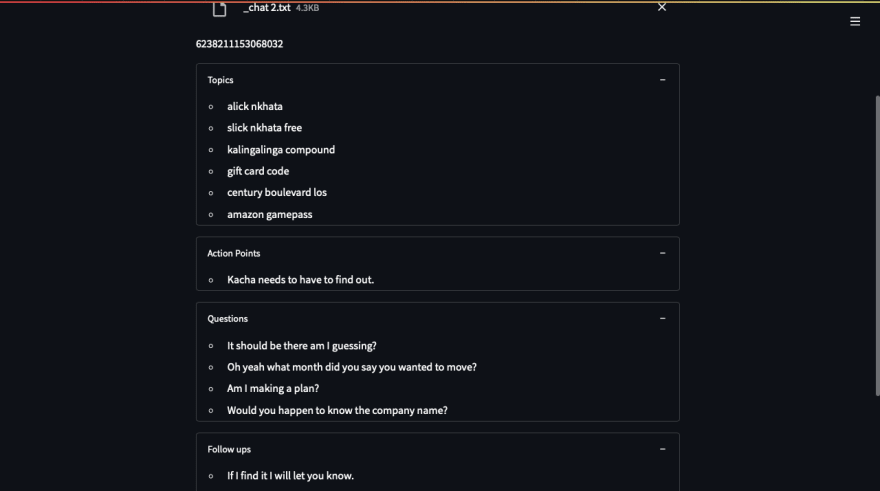An Interest In:
Web News this Week
- April 2, 2024
- April 1, 2024
- March 31, 2024
- March 30, 2024
- March 29, 2024
- March 28, 2024
- March 27, 2024
March 24, 2022 11:41 am GMT
Original Link: https://dev.to/kmukabe/whatsapp-chat-analyzer-web-app-with-python-and-symblai-in-100-lines-of-code-2jkc
Whatsapp chat analyzer web app with Python and Symbl.ai in < 100 lines of code!
Creating a Whatsapp Chat analyser web app with Symbl.ai and python in less than 100 lines of code
This application will take an .txt export of a Whatsapp chat. The application will then run conversational analysis on the .txt file. Symbl.ai will then extract information like follow ups, topics and action items.
The application requires the following libraries:
- streamlit: This library converts python scripts into web applications.
- symbl.ai: This is a conversational A.I library that can get insights from audio and text.
Starting the Streamlit app
Streamlit is a great library I found that can convert python scripts into a web application.
Lets create an application that will accept a whatsapp txt chat file and parse the chat data.
import streamlit as stchat_file = st.file_uploader("Select chat file")if chat_file: conversation_request = handle_uploaded_file(chat_file)To handle the file and extract the messages in a format that symbl will understand we need to create a function to do it.
def handle_uploaded_file(file): chat = file.read().decode("utf-8") # Split each line from the file into a list and strip all whitespace lines = chat.splitlines() lines = [line.strip() for line in lines] messages = [] cleaned_lines = [] # If line does not start with a Whatsapp date format [m/d/y, h:m:s am] then append it to the previous line. for x in range(len(lines)): if lines[x].find("[") == -1: cleaned_lines[-1] = f"{cleaned_lines[-1]} {lines[x]}" continue cleaned_lines.append(lines[x]) # pares the time, name and message from a line for line in cleaned_lines: st_dt, en_dt = line.find("["), line.find("]") time = line[st_dt:en_dt].replace("[", "") name = line[en_dt:].split(":")[0].replace("]", "") st_m = line[en_dt:].find(":") message = line[en_dt:][st_m:].replace(":", "") # Create messages in the format Symbl requires messages.append( { "duration": {"startTime": arrow.get(time, 'M/D/YY, H:mm:ss A').format(), "endTime": arrow.get(time, 'M/D/YY, H:mm:ss A').format()}, "payload": {"content": message, "contentType": "text/plain"}, "from": {"name": name, "userId": name}, } ) return { "name": "Chat", "confidenceThreshold": 0.6, "detectPhrases": True, "messages": messages, }Once we have the messages from the handle request file we can analyse it with Symbl.ai
import symbl...conversation_object = symbl.Text.process(payload=conversation_request)Displaying the results
Add some display components using streamlit.
with st.expander("Topics"): with st.spinner("Getting topics"): topics = symbl.Conversations.get_topics(conversation_id=conversation_id) for topic in topics.topics: st.write(f"- {topic.text}")with st.expander("Action Points"): with st.spinner("Getting action items"): action_items = symbl.Conversations.get_action_items(conversation_id=conversation_id) for item in action_items.action_items: st.write(f"- {item.text}")with st.expander("Questions"): questions = symbl.Conversations.get_questions(conversation_id=conversation_id) for question in questions.questions: st.write(f"- {question.text}")with st.expander("Follow ups"): follow_ups = symbl.Conversations.get_follow_ups(conversation_id=conversation_id) for follow_up in follow_ups.follow_ups: st.write(f"- {follow_up.text}")The final code file
import streamlit as stimport arrowimport symbldef handle_uploaded_file(file): chat = file.read().decode("utf-8") lines = chat.splitlines() lines = [l.strip() for l in lines] messages = [] cleaned_lines = [] for x in range(len(lines)): if lines[x].find("[") == -1: cleaned_lines[-1] = f"{cleaned_lines[-1]} {lines[x]}" continue cleaned_lines.append(lines[x]) for line in cleaned_lines: st_dt, en_dt = line.find("["), line.find("]") time = line[st_dt:en_dt].replace("[", "") name = line[en_dt:].split(":")[0].replace("]", "") st_m = line[en_dt:].find(":") message = line[en_dt:][st_m:].replace(":", "") messages.append( { "duration": {"startTime": arrow.get(time, 'M/D/YY, H:mm:ss A').format(), "endTime": arrow.get(time, 'M/D/YY, H:mm:ss A').format()}, "payload": {"content": message, "contentType": "text/plain"}, "from": {"name": name, "userId": name}, } ) return { "name": "Chat", "confidenceThreshold": 0.6, "detectPhrases": True, "messages": messages, }chat_file = st.file_uploader("Select chat file")if chat_file: conversation_request = handle_uploaded_file(chat_file) with st.spinner("Analysing Text"): conversation_object = symbl.Text.process(payload=conversation_request) conversation_id = conversation_object.get_conversation_id() st.write(conversation_id) with st.expander("Topics"): with st.spinner("Getting topics"): topics = symbl.Conversations.get_topics(conversation_id=conversation_id) for topic in topics.topics: st.write(f"- {topic.text}") with st.expander("Action Points"): with st.spinner("Getting action items"): action_items = symbl.Conversations.get_action_items(conversation_id=conversation_id) for item in action_items.action_items: st.write(f"- {item.text}") with st.expander("Questions"): questions = symbl.Conversations.get_questions(conversation_id=conversation_id) for question in questions.questions: st.write(f"- {question.text}") with st.expander("Follow ups"): follow_ups = symbl.Conversations.get_follow_ups(conversation_id=conversation_id) for follow_up in follow_ups.follow_ups: st.write(f"- {follow_up.text}")Screenshots of our final application
Original Link: https://dev.to/kmukabe/whatsapp-chat-analyzer-web-app-with-python-and-symblai-in-100-lines-of-code-2jkc
Share this article:
Tweet

View Full Article
Dev To
 An online community for sharing and discovering great ideas, having debates, and making friends
An online community for sharing and discovering great ideas, having debates, and making friendsMore About this Source Visit Dev To




